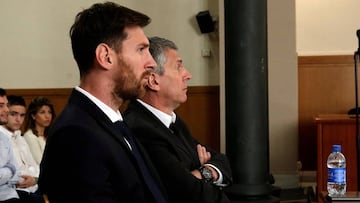Messi tax fraud different to cases involving Casillas, Villa, others...
Barcelona striker Messi used front-companies to hide his image rights income from the tax man; the tax cases involving Casillas, Villa and others were very different.</br><a title="Ecuador-Argentina live online: World Cup 2018" href="https://en.as.com/en/2017/10/10/football/1507639962_082998.html">Ecuador-Argentina</a>

Barcelona have come out in strong defence of their star striker Leo Messi, after he was convicted of tax fraud and sentenced to 21 months in jail, which he almost certainly however won't serve.
Barcelona backing Leo Messi
The club are running a social media campaign to back the star, #WeAreAllLeoMessi, but after it was hugely criticised for supporting someone convicted of tax fraud, Barcelona spokesman Josep Vives came out on Monday to make a statement defending both the campaign and Messi.
According to Barcelona, Messi has not been treated equally
One of the arguments Vives employed was, "there have been other famous figures who have not been through the same situation as Messi". Vives decided not to say who he was referring to.
This statement has been enough to convince many, particularly Barcelona and Messi fans, that the Messi case is legally equivalent to tax cases in the past couple of years involving footballers such as Iker Casillas, David Villa, Sergio Ramos, Gerard Piqué and numerous others, who have been pursued for millions of euros in tax in relation to their image rights, and yet have not been accused of tax fraud or put on trial.
However the reason for the difference in treatment is that the tax situations of these other footballers are entirely different from the facts in Messi's case, where the striker used an opaque structure involving companies in Belize and Uruguay to hide income, something Casillas and the others never did.
Casillas and the other players declared their image rights income
Indeed in the cases involving Casillas and others all the income from the image rights was declared to the Spanish taxman, with the investigations arising because of a change in the tax authorities' approach to the rules.
In these cases the players applied a rule, known as the 85/15 rule, included in the tax law as of 1996 that benefited players by allowing them to treat 15% of their income as coming from image rights ceded to their club, which could then be earnt in a company, paying tax at 30% under the corporate income tax rate, rather than the much higher (52%-56%) personal income tax rate. The remaining 85% of the players' income from the club had to be earnt as salary and subject to personal income tax.
New tax rules in 2006
In 2006 a new provision was included in the tax rules which required all transactions between an individual and their 'related parties', a concept including companies owned by them, to be carried out at market value. Applying this market value rule would mean that the players should be paid a market rate by their companies when they transferred their image rights to that company, rather than transferring for nothing as tended to be the case.
Given the companies themselves did nothing other than hold the rights, this payment from the company to the player would be for the entire value of the image rights, and being earned directly by the player would mean they would end up paying tax at the higher personal tax rate anyway, negating the effect of the 1996 rule.
This situation created by the conflict between the 1996 and 2006 rules leads to a legal absurdity, as recognised by numerous tax experts and gives no certainty as to how the laws should be interpreted.
Tax authorities took eight years to act
The tax authorities did nothing in respect of the new 2006 rules until about eight years later, when it started investigating players, applying the 2006 rules and demanding the image rights income be treated as earned by them personally, rather than through their companies. The effect of this was that the tax authorities hit the players with demands for back-tax for the difference between paying at the 52-56% top personal income tax rate and the lower 30% corporate income tax rate for the years investigated.
Casillas and Villa paid the difference
The majority of the players, Casillas and Villa included, while unhappy at the sudden change in criteria from the tax authorities, paid up. However, in none of these cases was any of the income in question hidden from the tax authorities; all of it was declared to the Spanish tax man. The players had reasonable legal arguements for why they had applied the 1996 85/15 rule to the income, and while the tax authorities eventually disagreed with the players' interpretation they never found any basis for considering the actions of the players to be fraudulent.
Messi case about hiding income from tax authorities
Related stories
The Messi case is entirely different, as Ransés Pérez-Boga, president of the Tax Inspectors association made clear back in 2014. The Barcelona player hid his image rights income from the Spanish tax man, using a fraudulent structure using companies in other countries including Belize and Uruguay. This Messi case is not about a discrepancy over the provisions in the Spanish tax law, it is simply about hiding income. Hence the different approach from the tax authorities.
As Carlos Cruzado, president of the Tax Inspectors Union said yesterday to this newspaper in respect of Messi's tax structure: "This type of crime is very, very serious... [Messi] defrauded various millions of euros using front companies".